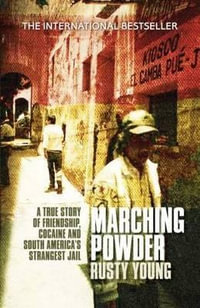
Prison Policy in Ireland
Politics, Penal-Welfarism and Political Imprisonment
By: Mary Rogan
Paperback | 28 March 2011 | Edition Number 1
At a Glance
264 Pages
22.86 x 15.24 x 1.27
Paperback
RRP $101.00
$77.95
23%OFF
or 4 interest-free payments of $19.49 with
orAvailable for Backorder. We will order this from our supplier however there isn't a current ETA.
This book is the first examination of the history of prison policy in Ireland. Despite sharing a legal and penal heritage with the United Kingdom, Ireland's prison policy has taken a different path. This book examines how penal-welfarism was experienced in Ireland, shedding further light on the nature of this concept as developed by David Garland. While the book has an Irish focus, it has a theoretical resonance far beyond Ireland. This book investigates and describes prison policy in Ireland since the foundation of the state in 1922, analyzes and assesses the factors influencing policy during this period and explores and examines the links between prison policy and the wider social, economic, political and cultural development of the Irish state.
It also explores how Irish prison policy has come to take on its particular character, with comparatively low prison numbers, significant reliance on short sentences and a policy-making climate in which long periods of neglect are interspersed with bursts of political activity all prominent features.
Drawing on the emerging scholarship of policy analysis, the book argues that it is only through close attention to the way in which policy is formed that we will fully understand the nature of prison policy. In addition, the book examines the effect of political imprisonment in the Republic of Ireland, which, until now, has remained relatively unexplored.
This book will be of special interest to students of criminology within Ireland, but also of relevance to students of comparative criminal justice, criminology and criminal justice policy making in the UK and beyond.
Industry Reviews
'...the breadth of the historical analysis within this book allows for a wider view of the role that prisons have played in state security.'
'[Rogan's] book is an important contribution to the growing canon of criminological research in Ireland. It is also provides a fascinating historical overview that reminds one of the relevance of history to the present.'-Dr Nicola Carr, Queen's University Belfast, in the Irish Probation Journal, vol 8 Oct 2011
'...the breadth of the historical analysis within this book allows for a wider view of the role that prisons have played in state security.'
'[Rogan's] book is an important contribution to the growing canon of criminological research in Ireland. It is also provides a fascinating historical overview that reminds one of the relevance of history to the present.'-Dr Nicola Carr, Queen's University Belfast, in the Irish Probation Journal, vol 8 Oct 2011
'Rogan's analysis is most intriguing in her ability to tell the history of ideas about prisons within Irish policy circles. In a sense, this text is as much an intellectual history of prisons in Ireland as it is a political or criminological study of these institutions.The best example of this involves the elusive idea that rehabilitation of the offender can be the primary function of incarceration. Rogan deftly demonstrates how rehabilitation as a concept served multiple functions in the development of Irish prison policy over time (including those epochs in which rehabilitation fell from grace as the organizing principle for incarceration in the state). Further, Rogan's analysis is exhaustive in its identification and consideration of the myriad factors contributing to these ideas (most notably, political prisoners and the state's ability to finance its prisons), and how those ideas were brought to bear on legislation and policy through the efforts of change agents. These strengths are impressive, and function to set Rogan's work apart from others whose scholarship examines and critiques penal policy in Ireland...'
'...this critical study will enrich and enliven undergraduate and graduate seminars on prisons and political culture in Ireland and comparative criminal justice in the U.K., Europe, and the U.S....a pleasure to read.'-Taja-Nia Y. Henderson, Rutgers School of Law in Criminal Law and Criminal Justice Books, posted May 2012
"The fluid and compelling prose in the book brings the intracacies of policy formation and the unique aspects of Irish politics and culture to life. It outlines the colourful context in which Irish penal policy took shape - from the widepsread use of confinement by non-state institutions, to mass releases to celebrate religious occasions and audacious helicopter escapes. The thorough analysis provides a useful historical narratives and reinserts the question of agency into broader discussions about the socio-economic and cultural context of policy formation."- Roisin Mulgrew, Punishment & Society
| List of Figures | p. xi |
| Acknowledgements | p. xiii |
| Introduction | p. xv |
| Understanding prison policy: the sociology of punishment and policy-making | p. 1 |
| Introduction | p. 1 |
| The sociology of punishment | p. 1 |
| Linking structural change and political choice: policy analysis | p. 8 |
| Theoretical perspectives on prison policy and its formation | p. 9 |
| Influences on policy | p. 11 |
| The Irish context | p. 14 |
| Policy analysis and the sociology of punishment for Ireland | p. 18 |
| A word on methodology | p. 18 |
| From Independence to the 'Emergency': Civil War and conservative administration | p. 20 |
| Introduction | p. 20 |
| Opposition to the Treaty leads to conflict | p. 20 |
| The prison system in the Irish Free State | p. 71 |
| Detention during the Civil War | p. 22 |
| Reaction of detainees: resistance and organisation | p. 25 |
| Prisoner grievances | p. 27 |
| Public sympathy: prisoner support networks | p. 28 |
| The situation at the end of the Civil War | p. 30 |
| The plight of 'ordinary' detainees | p. 31 |
| The re-establishment of normality | p. 32 |
| The General Prisons Board and the 'ethos' of prison policy | p. 34 |
| Declining prisoner numbers and closure of prisons | p. 35 |
| The dissolution of the General Prisons Board | p. 36 |
| The Department of Justice and prison policy | p. 37 |
| Prison policy in the post-Civil War period: caution and conservatism | p. 40 |
| The nature of Free State public administration | p. 45 |
| Social change and prisons during the 1930s | p. 50 |
| Insularity and the British inheritance | p. 52 |
| The absence of a wider 'community of ideas' | p. 52 |
| The 'Emergency': the recurring effects of subversion and stagnation | p. 54 |
| Introduction | p. 54 |
| Imprisonment and internment: securing the state | p. 54 |
| The political status of prisoners and the authority of the state | p. 55 |
| 'Ordinary' imprisonment: liberalisation of prison regimes | p. 58 |
| Increased interest from outside the prison system | p. 59 |
| Inquest and inquiry following the end of the Emergency | p. 62 |
| The Labour Party Report | p. 64 |
| The Prison Rules 1947 | p. 68 |
| Fianna Fail loses Republican support | p. 70 |
| 'Liberalisation' and changes in Irish social policy | p. 71 |
| The 1950s: low numbers and limited interest | p. 74 |
| Introduction | p. 74 |
| The first Inter-Party Government | p. 74 |
| Fianna Fáil return to power | p. 80 |
| The second Inter-Party Government | p. 81 |
| The Border Campaign and its effect on prison policy | p. 82 |
| Stasis in prison policy 1948-58 | p. 84 |
| Political culture and social policy: drift and decay | p. 84 |
| Political culture and prison policy in the 1950s | p. 88 |
| Prison reform, not penal reform | p. 89 |
| The 1960s: 'solo runs' and social change | p. 91 |
| Introduction | p. 91 |
| A tale of two Ministers for Justice: a break with the past | p. 92 |
| Charles Haughey takes the reins: a transformed Department of Justice | p. 95 |
| The Inter-Departmental Committee | p. 97 |
| Department of Justice plans: radical changes envisaged | p. 106 |
| Innovation in prison policy becomes the aim not anathema | p. 108 |
| Haughey moves on | p. 110 |
| Lenihan as Minister for Justice: a continuity in discourse | p. 111 |
| Another new Minister for Justice: Micheál Ó Moráin | p. 112 |
| Rehabilitation in theory: recycling ideas and raised expectations | p. 113 |
| The Irish Society of Criminology | p. 115 |
| Research and the Department of Justice | p. 115 |
| Social investigation: media portrayal of prison policy | p. 116 |
| Rehabilitation in practice: symbolism in policy versus execution in reality | p. 117 |
| The Criminal Justice Bill 1967 | p. 119 |
| Ireland in the early 1960s: a time of change | p. 121 |
| The late 1960s: consolidation, a change of pace and conflicts | p. 125 |
| The 1970s: subversion, suspicion and tension | p. 130 |
| Introduction | p. 130 |
| Rehabilitation in the 1970s: an official aim | p. 130 |
| Consensus, caution and change in prison policy | p. 132 |
| New institutions: a reactive approach | p. 135 |
| The 'Troubles' | p. 137 |
| The Prisons Act 1972 | p. 139 |
| Prison policy and Republican prisoners | p. 141 |
| Prisoner advocacy and protest | p. 143 |
| Secrecy and suspicion in the Department of Justice | p. 146 |
| Crisis management | p. 147 |
| Irish prison policy during the 1970s | p. 148 |
| Ireland in the 1970s: the Troubles, social expansion, and other 'troubles' ahead | p. 150 |
| Prison policy during the 1970s: the genesis of crisis? | p. 154 |
| The 1980s: crises and committees | p. 155 |
| Introduction | p. 155 |
| A prison system in crisis | p. 156 |
| The panacea of penal expansion | p. 162 |
| 'Getting by': pragmatic prison policy | p. 164 |
| Crime and cost: concern in political debate | p. 165 |
| The Whitaker Committee | p. 166 |
| An embryonic politicisation of crime? | p. 170 |
| Ireland during the 1980s | p. 171 |
| Prison policy in the 1980s | p. 176 |
| The 1990s: the crucial decade | p. 177 |
| Introduction | p. 177 |
| The early 1990s: familiar problems continue | p. 178 |
| The Management of Offenders strategy document | p. 179 |
| Political focus and debate on prison issues | p. 182 |
| Electoral politics, concern about conditions and penal expansion | p. 184 |
| The general election of 1997 | p. 187 |
| The new government's plans for expansion | p. 189 |
| Prison policy at the beginning of the Celtic Tiger era | p. 191 |
| Prison policy since 2000 and beyond | p. 193 |
| Introduction | p. 193 |
| Continued plans for penal expansion | p. 194 |
| The McDowell factor | p. 194 |
| Finance: a different kind of concern | p. 198 |
| Changes in perspective | p. 200 |
| Prison policy after McDowell | p. 202 |
| The prison system in the late 2000s | p. 203 |
| Prison policy at the end of the Celtic Tiger era | p. 205 |
| Conclusion: unravelling the nature of Irish prison policy | p. 206 |
| Introduction | p. 206 |
| Political imprisonment | p. 206 |
| Irish prison policy | p. 207 |
| Ireland and penal-welfarism | p. 210 |
| Politics and welfare policy | p. 211 |
| Theoretical eclecticism - Ireland's modernisation | p. 213 |
| Policy analysis and the sociology of punishment | p. 214 |
| Appendix: Irish prison statistics 1922-2008 | p. 216 |
| Bibliography | p. 219 |
| Index | p. 231 |
| Table of Contents provided by Ingram. All Rights Reserved. |
ISBN: 9780415616195
ISBN-10: 0415616190
Published: 28th March 2011
Format: Paperback
Language: English
Number of Pages: 264
Audience: Professional and Scholarly
Publisher: Taylor & Francis Ltd
Country of Publication: GB
Edition Number: 1
Dimensions (cm): 22.86 x 15.24 x 1.27
Weight (kg): 0.41
Shipping
| Standard Shipping | Express Shipping | |
|---|---|---|
| Metro postcodes: | $9.99 | $14.95 |
| Regional postcodes: | $9.99 | $14.95 |
| Rural postcodes: | $9.99 | $14.95 |
How to return your order
At Booktopia, we offer hassle-free returns in accordance with our returns policy. If you wish to return an item, please get in touch with Booktopia Customer Care.
Additional postage charges may be applicable.
Defective items
If there is a problem with any of the items received for your order then the Booktopia Customer Care team is ready to assist you.
For more info please visit our Help Centre.
You Can Find This Book In

BOXING DAY
RRP $22.99
$9.25
OFF

BOXING DAY
RRP $19.99
$7.95
OFF

BOXING DAY
RRP $34.99
$20.95
OFF

BOXING DAY
RRP $19.99
$7.95
OFF

BOXING DAY
RRP $19.99
$7.95
OFF


















